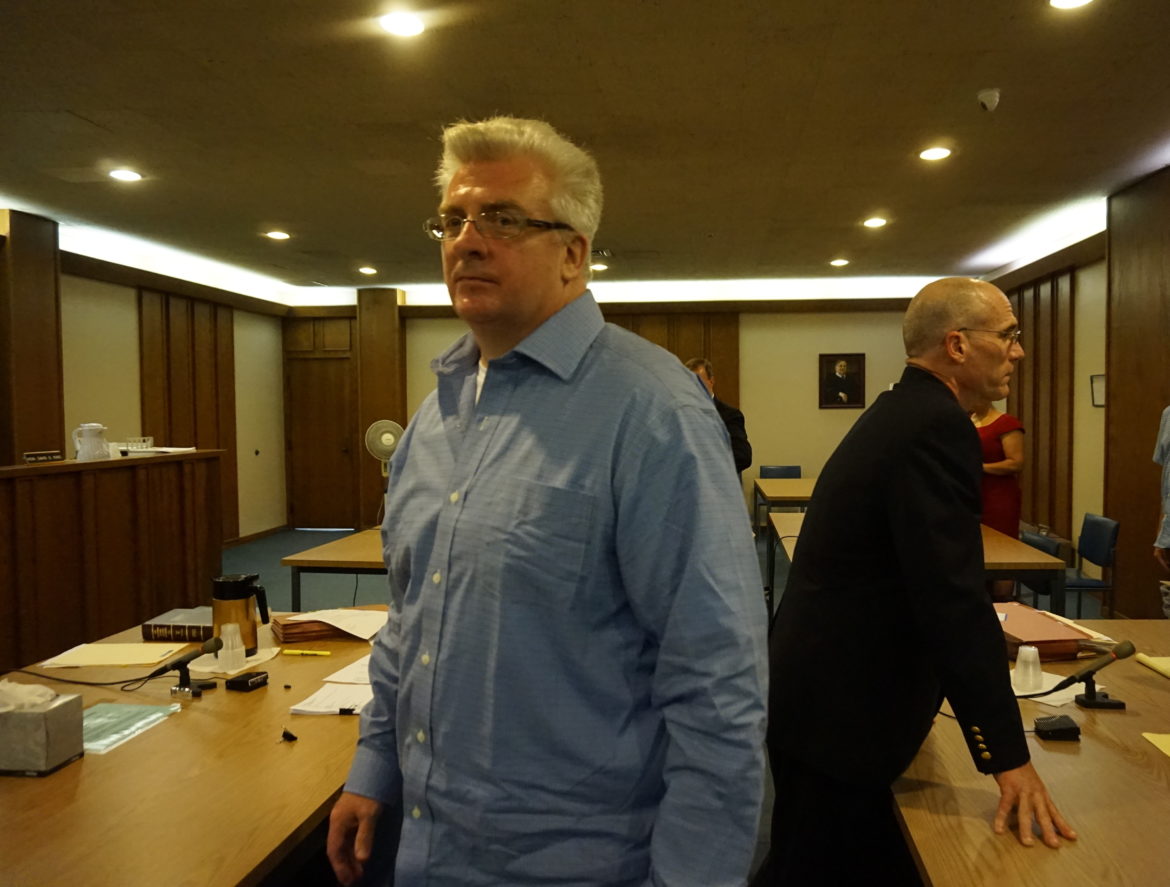CONCORD — Five memos submitted during Eric Largy’s Probate Court hearing on Tuesday show the Attorney General’s Office has been calling the shots as to his discharge from the state’s psychiatric hospital since he was moved there in April from the Secure Psychiatric Unit at state prison.
Largy, 49, was deemed incompetent to stand trial in the alleged 2009 beating of his father, retired Nashua Police Chief Clifton Largy, and was only recently re-indicted on the criminal charges after being locked up for seven years in state custody.
“Basically, if you look at the last memo, what that says is Eric is not to be released until the attorney general directs him to be released,” Shane Stewart, Largy’s attorney, told Probate Court Judge David King.
“These are medical decisions,” Stewart said. “These shouldn’t be decisions influenced by the chief law enforcement officer in the state.”
Eric Largy was involuntarily committed to the Secure Psychiatric Unit for five and a half years after spending almost two years in Valley Street Jail awaiting trial on the original criminal charges, which were dropped.
In May, Largy was re-indicted in connection with the same incident that he claims was self-defense and his father says was a vicious, unprovoked attack in Nashua that left him with a broken chin and fractured eye sockets.
Stewart said the memos back up Largy’s claim that originally caused him to be declared not competent – that his father’s law enforcement connections played a role in his involuntary commitment to the Secure Psychiatric Unit instead of going to trial. Clifton Largy has denied those allegations.
“Eric’s concern and really the primary basis for (his) delusional disorder (diagnosis) is that he thought his father was influencing the process, that the chief law enforcement officer in the state – the Attorney General’s Office – had played a role in his going to the Secure Psychiatric Unit and had some say in whether he was being discharged or not,” Stewart said.
Later Tuesday, Judge King dismissed the state’s petition to have Largy recommitted for another five years and discharged him from the hospital.
The hospital’s lawyer, Lynne Mitchell, told the court that the memos contain legal advice from Associate Attorney General Anne Edwards from the civil side of the Attorney General’s Office. It was relative to Largy’s risk assessment if he was to be released and had nothing to do with the criminal bureau, Mitchell said.
“I didn’t want to have it misconstrued that it’s the criminal side saying, ‘hey don’t discharge him,’” Mitchell said.
King made his order effective Monday to allow Largy to appear for a bail hearing in Hillsborough County Superior Court South on the criminal charges, which include two counts of first-degree assault and one count of kidnapping. As it stands, Largy’s bail would be $100,000 cash, which his lawyers say he will be unable to post.
He could then be sent to Valley Street Jail to await trial on the newly re-indicted charges. In the criminal case, however, Judge Charles S. Temple has indicated he may reduce Largy’s bail to personal recognizance.
CEO memos
The memos from Robert MacLeod, the New Hampshire Hospital’s chief executive officer, to Largy’s then-psychiatrist, Dr. Matthew Davis, also show the Administrative Review Committee only supported Largy being discharged if he were to go immediately to jail.
On May 25, MacLeod wrote: “The (Administrative Review Committee) supports Mr. Largy’s absolute discharge provided that Mr. Largy will be required to return to jail due to high bail and his being unable to post bail.
“If it is likely he will be able to make bail and be released to the community, the Team will return to the (Administrative Review Committee) for further review of discharge plans.”
On June 1, MacLeod wrote: “As the Attorney General’s Office does not support Mr. Largy’s absolute discharge, the (Administrative Review Committee) is amending its earlier finding as the committee cannot support his absolute discharge at this time. The Attorney General’s Office will contact the CEO once they have fully reviewed his case.”
And on June 8, MacLeod wrote another memo: “(Largy) will remain at NHH until further direction is received by the Attorney General’s Office.”
Deputy Health and Human Services Commissioner Marilee Nihan responded to a request to interview MacLeod.
“I can confirm that the memos do exist,” Nihan said. She said it is not unusual for a state agency to coordinate with the Attorney General’s Office because the civil bureau represents state agencies.
“(MacLeod) also confirmed that the attorney general does not determine any of the medical actions or procedures at the hospital,” Nihan said. “These cases are difficult cases.”
Reached by phone after the hearing, Associate Attorney General Edwards said she couldn’t speak about the memos because they involve lawyer/client privilege. Edwards said the memos were confidential and “inappropriately released” and it would violate a lawyer’s ethical code of conduct for her to discuss them.
Stewart, who submitted the memos in court, disagreed and said they were part of Largy’s file and were not inappropriately released.
Recommital hearings are usually closed to the public and press, but Largy asked that they be open to shine light on his case.
Hospital assistance
Hospital attorney Mitchell told Judge King the hospital will pay for Largy to stay for 30 days in a rooming house and refer him to Labor Ready, the local food pantry, peer counseling, and negotiate for outpatient counseling.
Mitchell wanted Largy released immediately, but Stewart, and Largy’s public defenders, Suzanne Ketteridge and Michael Davidow, who also attended the hearing, argued to hold off until Monday so Judge Temple can preside over his bail hearing.
Mitchell said there were 30 to 40 people waiting for beds at the psychiatric hospital. “The hospital is quite ready to have him not be at the hospital,” Mitchell said.
Judge King ruled: “It is not unreasonable that his release be timed so that the superior court judge most familiar with this case can conduct the next bail hearing.”
Mitchell said Largy’s nurse described him as the most polite patient she ever worked with at the hospital. Five psychiatrists who have testified in previous hearings all said Largy was a gentleman who helped other patients, especially those who were being bullied.
But Mitchell also cited his refusal to engage in treatment. Largy still doesn’t believe he is mentally ill, Mitchell said.
“Eric politely declines to discuss the reasons why he is at New Hampshire Hospital,” Mitchell said.
Stewart responded: “Obviously he is not going to sit there and once again rehash how it was self-defense, which is what he already stated numerous times in the first couple of years, then finally gave up trying to explain what happened.”
Stewart reminded the court that it was the state, not Largy’s defense attorney, that insisted on his original competency assessment instead of going to trial on the criminal charges soon after the incident.
“That’s very unusual,” Stewart said. “That’s when Eric said, ‘What’s going on here? I want to stand trial.’ He wasn’t allowed to.”





